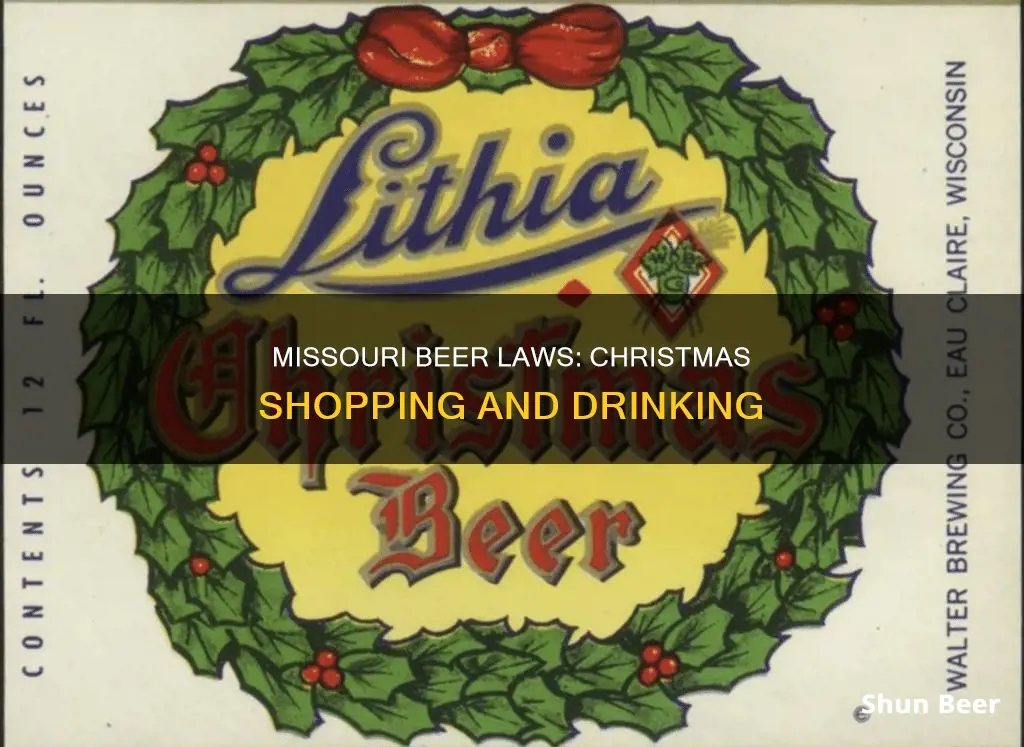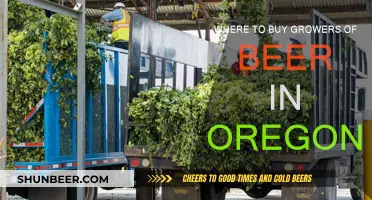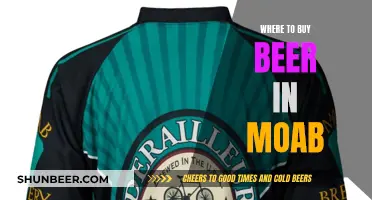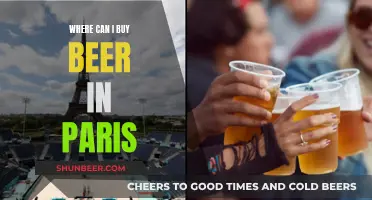
Missouri has some of the most relaxed drinking laws in the United States. The state has a reputation for its laissez-faire approach to alcohol regulation, in stark contrast to its neighbours, such as Kansas and Oklahoma. So, can you buy beer in Missouri on Christmas?
| Characteristics | Values |
|---|---|
| Alcohol sales on Christmas Day | Alcohol can be purchased on Christmas Day in Missouri, but only from licensed liquor stores or restaurants. |
| Alcohol sales hours | Alcohol can be purchased from 6 a.m. to 1:30 a.m. daily, including Christmas Day. |
| Alcohol sales restrictions | No statewide liquor restriction law in Missouri. However, some stores may have different hours, and grocery and convenience stores are generally closed on Christmas Day. |
| To-go cocktails | Allowed if purchased with food and in tamper-proof, sealed containers. Limited to two drinks per meal. |
| Open container laws | No state law prohibiting open containers in vehicles or public places for those 21 or older. However, some localities have specific laws against open containers. |
| Drinking age | 21 years old |
What You'll Learn

Beer can be purchased from 6 a.m. to 1:30 a.m. on Christmas Day in Missouri
Missouri's alcohol laws are among the most permissive in the United States. The state is known for its laissez-faire approach to alcohol regulation, in contrast to its neighbours, such as Kansas and Oklahoma, which have very strict alcohol laws.
Missouri has no statewide liquor restriction law, and liquor stores are allowed to sell alcohol, beer, or wine on Christmas Day if they decide to stay open. This means that beer can be purchased from 6 a.m. to 1:30 a.m. at any Missouri liquor store, according to state law. Some stores may have different hours, so it is advisable to check with your closest store to see when they are open.
Missouri's permissive alcohol laws are a result of its position as the leading alcohol-producing state in America. It is well known for wine production in the Missouri Rhineland and for beer production in St. Louis by Anheuser-Busch, the producer of Budweiser. Anheuser-Busch is the principal advocate of keeping Missouri's alcohol laws relaxed.
The state's relaxed approach to alcohol regulation has historical roots. During the height of the temperance movement in the late 19th and early 20th centuries, Missouri never implemented its own statewide prohibition. On the contrary, voters in the state rejected prohibition in three separate initiative elections in 1910, 1912, and 1918. When temperance crusader Carrie A. Nation entered a bar in Kansas City in 1901 and began smashing liquor bottles, she was promptly fined and ordered to leave the state.
Today, Missouri has no dry jurisdictions, and alcohol can be purchased at various locations, including bars and restaurants, breweries and taprooms, gas stations, grocery stores, and liquor stores. The state also allows for the delivery of beer through services like Drizly and Total Wine.
Buying Beer on New Year's Day: What's the Deal?
You may want to see also

There is no statewide liquor restriction law in Missouri
Missouri has some of the most relaxed drinking laws in the country. There is no statewide liquor restriction law in Missouri, and the state is known for its laissez-faire approach to alcohol regulation. This is in sharp contrast to some of its neighbouring states, such as Kansas and Oklahoma, which have very strict alcohol laws.
Missouri's relaxed approach to alcohol regulation is partly due to its position as the leading alcohol-producing state in America. It is well known for its wine production in the Missouri Rhineland and its beer production in St. Louis by Anheuser-Busch, the producer of Budweiser. Anheuser-Busch is the principal advocate of keeping Missouri's alcohol laws as relaxed as they are.
During the height of the temperance movement in the late 19th and early 20th centuries, Missouri never implemented its own statewide prohibition. On the contrary, voters in Missouri rejected prohibition in three separate initiative elections in 1910, 1912, and 1918. When temperance crusader Carrie A. Nation entered a bar in Kansas City in 1901 and began smashing liquor bottles with her hatchet, she was promptly arrested and fined $500.
In 1857, a Missouri statute left all liquor regulation to localities, including the question of whether to prohibit alcohol sales, except for the collection of licensing fees. As a result, despite the lack of statewide prohibition, by the end of nationwide prohibition in 1934, half of Missouri's counties had prohibited alcohol sales. In 1934, Missouri enacted its first Liquor Control Law, which repealed and superseded local laws, marking the first time Missouri had any statewide control of liquor.
Today, Missouri has no dry jurisdictions, and alcohol can be purchased at grocery stores, gas stations, and similar businesses that acquire the proper permits. There are minimal restrictions on when you can buy beer in Missouri, and it can be purchased from 6 a.m. to 1:30 a.m. daily. Municipalities across the state may have separate laws, and some bars can stay open until 3 a.m.
Retail locations, bars, and restaurants can sell beer from 6 a.m. to 1:30 a.m. Monday through Saturday with a general alcohol sales permit. These locations can sell on Sundays during the same times with a Sunday sales permit, which costs businesses $600 per year.
Non-Alcoholic Beer: Canada's Legal Drinking Age Limits
You may want to see also

Missouri has a three-tier distribution system for alcohol sales
Yes, you can buy beer in Missouri on Christmas Day. There is no statewide liquor restriction law in Missouri, so liquor stores can sell alcohol, beer, or wine on Christmas Day if they decide to stay open. According to state law, you can buy alcohol from 6 am to 1:30 am at any Missouri liquor store. However, some stores may have different hours, so it's best to check with your closest store.
Now, onto Missouri's three-tier distribution system for alcohol sales. This system is applicable to all 50 states, including Missouri, and it dictates that all facets of alcohol sales must follow a three-tier model. This means that every producer and seller of alcoholic beverages must work with a "middle-tier" company, which is typically a wholesaler or importer. This industry-wide system is set up to affect everyone in the industry at all tiers.
In Missouri, the three tiers are the manufacturer, the distributor, and the retailer. The manufacturer produces the alcoholic beverages, the distributor purchases the products from the manufacturer and sells them to the retailer, and the retailer sells the products to the public. Each level of the three-tier distribution system is required to have a license to sell, and there are laws in place that dictate how these tiers interact with each other and the public.
The three-tier system is intended to prohibit tied houses and prevent "disorderly marketing conditions." It was set up in the United States after the repeal of Prohibition to regulate and control the alcohol industry and levy and collect taxes on alcohol producers. While most states follow this system, there are some exceptions and variations. For example, some states allow brewpubs, which are both producers and retailers, to operate without selling to a distributor. Additionally, rules can vary depending on the relationships between the tiers, such as whether a producer can give promotional items to a retailer.
Missouri's alcohol laws are among the most permissive in the United States, with a largely laissez-faire approach to alcohol regulation. This is partly due to Missouri being the leading alcohol-producing state in America, known for wine production in the Missouri Rhineland and beer production in St. Louis by Anheuser-Busch. Missouri has no dry jurisdictions, and alcohol can be purchased at various locations, including grocery stores, gas stations, and similar businesses that acquire the proper permits.
Buying Beer Early: What Time Is Too Early?
You may want to see also

Missouri's alcohol laws are among the most permissive in the US
Missouri's relaxed approach to alcohol regulation is partly due to its position as the leading alcohol-producing state in America, with wine production in the Missouri Rhineland and beer production in St. Louis by Anheuser-Busch, the producer of Budweiser. Anheuser-Busch is the principal advocate for keeping Missouri's alcohol laws lax. Missouri enacted its first Liquor Control Law in 1934, which repealed local laws that had previously banned Sunday liquor sales. This law prohibited the sale of beverages with more than 5% alcohol by volume on Sundays, but this restriction was lifted in 1975.
Today, Missouri has no dry jurisdictions, and alcohol can be purchased at grocery stores, gas stations, and similar businesses that acquire the proper permits. The state has no specific limitations on the places where alcohol can be sold "off-premises", meaning Missouri is known for its wide variety of beer, wine, and liquor available in many retail locations. Any retail business can sell alcohol as long as it is not located within 100 feet of a school or church and has the proper licenses. Missouri law even prohibits cities and counties from banning the off-premises sale of alcohol.
Missouri also has permissive laws regarding the consumption of alcohol. The state has no open container law for vehicles, sharing this characteristic with only six other states. While a driver is prohibited from consuming alcohol while driving, any non-driving vehicle passenger is permitted to possess an open container and consume alcohol while the vehicle is in motion. Additionally, Missouri is one of only six states with no state law prohibiting drinking in public. While most municipalities, including St. Louis and Kansas City, prohibit drinking in public, St. Louis allows picnickers in public parks to consume alcohol without limitation.
Missouri's alcohol laws also stand out for their permissive approach to minors and alcohol. While the drinking age in the state is 21, Missouri is one of six states that allow minors to consume alcohol if it is purchased by a parent or legal guardian and consumed on their private property. Additionally, Missouri is one of 20 states with no specific law prohibiting the consumption of alcohol by minors.
Chicago's Morning Beer Buying: What's the Deal?
You may want to see also

Missouri has no dry counties
Missouri has a famously relaxed approach to alcohol regulation, in stark contrast to some of its neighbouring states such as Kansas and Oklahoma. Missouri's permissive alcohol laws are partly due to its status as the leading alcohol-producing state in America, with wine production in the Missouri Rhineland and Budweiser beer production in St. Louis.
In fact, Missouri has no dry counties whatsoever. This is in part due to a 1934 Liquor Control Law, which repealed and superseded local laws that had previously allowed counties to go dry. This was the first time Missouri had any statewide control of liquor.
Missouri's alcohol laws are so relaxed that it is possible for a passenger to drink legally through a 250-mile (400 km) trip across Missouri on Interstate 70 between Downtown Kansas City and Downtown St. Louis, only closing the container while passing through the city limits of Independence, Bates City, Columbia, Foristell, and St. Charles.
Missouri's relaxed attitude towards alcohol regulation extends to Christmas. While liquor stores are allowed to sell alcohol on Christmas Day if they decide to stay open, there is no statewide liquor restriction law. This means that you can buy your preferred drink of choice from 6 a.m. to 1:30 a.m. at any Missouri liquor store, according to state law. Some stores may have different hours, so it is worth checking in with your closest store to see when they are open.
Beer Delivery: DoorDash's Alcohol Ordering Service Explained
You may want to see also
Frequently asked questions
Yes, you can buy beer in Missouri on Christmas. Missouri has no statewide liquor restriction law, and alcohol can be purchased from 6 a.m. to 1:30 a.m. daily.
You can buy beer from bars, restaurants, gas stations, grocery stores, and breweries in Missouri.
There are no statewide restrictions, but some municipalities may have separate laws.
No, you must be at least 21 years old to purchase alcohol in Missouri, and you will need a valid ID to prove your age.
Yes, Missouri law does not prohibit consuming alcohol in outdoor public places. However, it is illegal to consume alcohol in a school, church, or courthouse.







